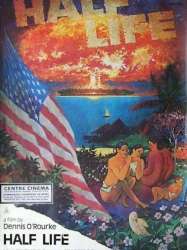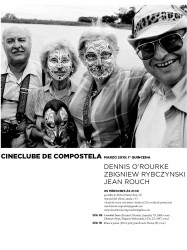Dennis O'Rourke est un Réalisateur, Scénariste et Producteur Australien né le 14 aout 1945 à Brisbane (Australie)

Dennis O'Rourke (14 August 1945 – 15 June 2013) was an Australian documentary filmmaker.
From 1974 until 1979 he lived in Papua New Guinea, which was in the process of decolonisation. He worked for the newly independent government, teaching documentary filmmaking skills to Papua New Guineans. His first film, Yumi Yet - Independence for Papua New Guinea, was completed in 1976, and it was widely acclaimed.
Retrospectives of O'Rourke's work have been held at the Amsterdam International Documentary Film Festival, the Berlin Film Festival, the Institute of Contemporary Art in London, the Pacific Film Archive in San Francisco; and in other cities, including Freiburg, Honolulu, Los Angeles, Marseille, Melbourne, New Delhi, New York, Singapore, Taipei, and Uppsala.
Dennis O'Rourke was the father of five children. He died of cancer on June 15, 2013 while producing and directing I Love a Sunburnt Country..., which is a feature film on the subject of being Australian, as seen through the poetry and poetic imagination of 'ordinary' people.
Source : Wikidata
Dennis O'Rourke

- Infos
- Photos
- Meilleurs films
- Famille
- Personnages
- Récompenses
Biographie
For most of his childhood, Dennis O'Rourke lived in a small country town, where his parents ran a failing business, until he was sent to a Catholic boarding school for his secondary education. In the late 1960s, after two years of fruitless university studies, he went travelling in outback Australia, the Pacific Islands and South East Asia. During this period he worked as a farm hand, salesman, cowboy, a roughneck on oil rigs, and as a maritime seaman. He also taught himself photography and dreamt of becoming a photojournalist. Wanting to make documentary films, he moved to Sydney where the Australian Broadcasting Corporation employed him as an assistant gardener. He later became a cinematographer for that organization.From 1974 until 1979 he lived in Papua New Guinea, which was in the process of decolonisation. He worked for the newly independent government, teaching documentary filmmaking skills to Papua New Guineans. His first film, Yumi Yet - Independence for Papua New Guinea, was completed in 1976, and it was widely acclaimed.
Retrospectives of O'Rourke's work have been held at the Amsterdam International Documentary Film Festival, the Berlin Film Festival, the Institute of Contemporary Art in London, the Pacific Film Archive in San Francisco; and in other cities, including Freiburg, Honolulu, Los Angeles, Marseille, Melbourne, New Delhi, New York, Singapore, Taipei, and Uppsala.
Dennis O'Rourke was the father of five children. He died of cancer on June 15, 2013 while producing and directing I Love a Sunburnt Country..., which is a feature film on the subject of being Australian, as seen through the poetry and poetic imagination of 'ordinary' people.
Filmographie de Dennis O'Rourke (3 films)
Réalisateur

Half Life (1986)
, 1h26Réalisé par Dennis O'Rourke
Genres Documentaire
Thèmes L'environnement, Documentaire sur l'environnement, Documentaire sur la guerre, Documentaire historique, Documentaire sur le nucléaire, Documentaire sur les technologies
Note78%






Couldn't Be Fairer (1984)
, 50minutesRéalisé par Dennis O'Rourke
Thèmes La mer, Transport, Documentaire sur le droit, Documentaire sur une personnalité, Documentaire sur la politique, Politique
Couldn't Be Fairer reveals how Australia's first people are still suffering from social oppression, with many living on reservations where alcoholism is rampant and unemployment the major occupation. Aboriginal land rights are a central theme: Miller clearly demonstrates the contrast between the attitudes of European Australians, who see the land only as a resource to be mined, farmed, grazed and built upon, and Aboriginal Australians, who regard the land as sacred. Archival footage compares the original lifestyle of Aboriginal Australians to their current pitiful condition, and shows how European settlers attempted to "civilize" mixed blood children by taking them away from their parents and enrolling them in boarding schools.
Scénariste

Half Life (1986)
, 1h26Réalisé par Dennis O'Rourke
Genres Documentaire
Thèmes L'environnement, Documentaire sur l'environnement, Documentaire sur la guerre, Documentaire historique, Documentaire sur le nucléaire, Documentaire sur les technologies
Rôle Ecrivain
Note78%





Producteur

Half Life (1986)
, 1h26Réalisé par Dennis O'Rourke
Genres Documentaire
Thèmes L'environnement, Documentaire sur l'environnement, Documentaire sur la guerre, Documentaire historique, Documentaire sur le nucléaire, Documentaire sur les technologies
Rôle Producteur
Note78%






Couldn't Be Fairer (1984)
, 50minutesRéalisé par Dennis O'Rourke
Thèmes La mer, Transport, Documentaire sur le droit, Documentaire sur une personnalité, Documentaire sur la politique, Politique
Rôle Producteur
Couldn't Be Fairer reveals how Australia's first people are still suffering from social oppression, with many living on reservations where alcoholism is rampant and unemployment the major occupation. Aboriginal land rights are a central theme: Miller clearly demonstrates the contrast between the attitudes of European Australians, who see the land only as a resource to be mined, farmed, grazed and built upon, and Aboriginal Australians, who regard the land as sacred. Archival footage compares the original lifestyle of Aboriginal Australians to their current pitiful condition, and shows how European settlers attempted to "civilize" mixed blood children by taking them away from their parents and enrolling them in boarding schools.
 Connexion
Connexion
